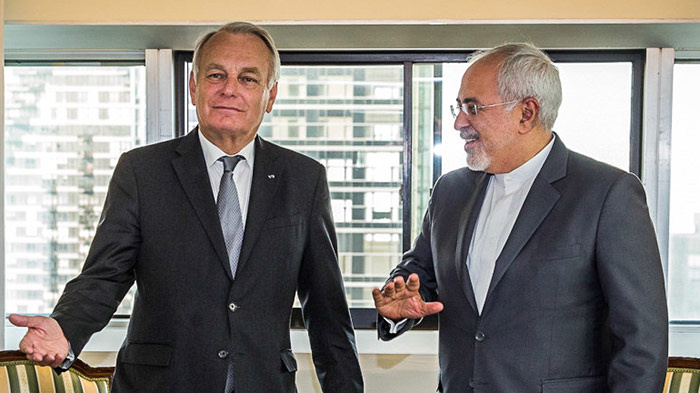Is France Taking the Lead to Keep the Nuclear Deal?

On Monday, French Minister of Foreign Affairs and International Development Jean-Marc Ayrault arrived in Tehran, just before nationwide ten-day celebrations that commemorate the victory of the Islamic Revolution. The visit comes at a time the nuclear deal between Iran and the West, implemented almost a year ago, is having fragile days since Donald Trump has taken office in the United States.
UK’s Prime Minister Theresa May has made contradictory remarks about Iran, and the Russian President Vladimir Putin has opted for silence vis-à-vis Trump’s remarks. On the other hand, the European Union has declared its full-blown support for the deal.
On Saturday, French Foreign Ministry announced the visit via a tweet, saying Ayrault will be in Tehran on January 30 and 31, to meet Iranian opposite number Javad Zarif and President Hassan Rouhani. The announcement coincided with a telephone conversation between French President François Hollande and US President Donald Trump, during which Hollande emphasized on commitment to the nuclear deal, warning that Trump should respect the Joint Comprehensive Plan of Action.
Trump has called the nuclear deal between Iran and world powers the ‘worst deal ever’ undersigned by the US. He had also said during his campaign that he would revoke or renegotiate the deal, if he succeeded to become president.
On the other hand, UK’s Theresa May advocates the deal but also takes harsh stances against Iran. During her recent US visit, May addressed Iran in the GOP’s Congress of Tomorrow conference. She said it was Britain’s priority to reduce Iran’s “malign influence in the Middle East” and support allies in the Persian Gulf States to push back against Iran’s aggressive efforts to build an “arc of influence” from Tehran through to the Mediterranean. “The nuclear deal with Iran was controversial. But it has neutralized the possibility of the Iranians acquiring nuclear weapons for more than a decade,” she said elsewhere in her speech.
Other European leaders have not come to terms with Trump’s approach to the nuclear deal. On the first anniversary of the nuclear deal’s implementation day, EU’s Federica Mogherini defended the deal. Germany, one of the members of the P5+1 that led the talks with Iran, also supports the deal. German diplomats and senior officials have repeatedly stressed the implementation of the deal.
It seems that the French Foreign Minister’s Tehran visit is intended to emphasize Hollande’s warning to Trump, in line with efforts to help improve the implementation.
“Jean-Marc Ayrault’s visit is quite significant in political terms. I hope it is an indicator that we have good ties with the EU, now that we have lost the US,” Europe expert Ali Bigdeli told Fararu.
Among other goals, the visit also includes regional talks. The situation in Syria and the fight against terrorism in the light of political developments in the US are probably the focal points for the French Foreign Minister.
The French Foreign Ministry website stated that Jean-Marc Ayrault would discuss regional issues, especially the crises in Syria, Yemen, Iraq, as well as Iran’s role in resolving them through utilization of political means such as fighting terrorism and peacemaking in the region.
The official website of the French Foreign Ministry also said additional goals for the visit, with an entourage of officials from sixty French firms, are to sign contracts between the sides and improve collaboration in education and research.
Iranian Deputy Foreign Minister Majid Takht-Ravanchi has told Iranian media outlets that the visit is a sequel to talks held with France previously. Referring to President Hassan Rouhani’s visit to Paris last year, during which he met several officials of the West Europe country, the senior foreign ministry official said many agreements were reached in several areas, the results of which are gradually becoming evident. “As an example, a contract was signed between France’s Peugeot and Iran Khodro, who will be releasing their joint product in the near future,” he added.
The French Foreign Minister is also taking part in the first joint economic summit between Iran and France, held in Tehran.
Saying the two countries’ joint committee will be held presided by the two foreign minister, Ravanchi explained that the committee incorporates several issues and the sides are now working on a joint document that will be issued at the end of the visit.
Ali Bigdeli believes that the visit made by the French Foreign Minister and another one expected in a few weeks by the German Foreign Minister indicate that Iran-EU ties will improve following the rift between EU and the United States. “If we could encourage France and Germany, as leaders of the EU, to make investments in Iran, other countries will definitely follow suit in what is a manifest gesture against the United States’ aggressive conduct.

